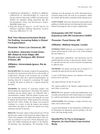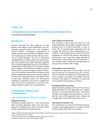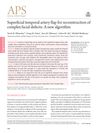Search
for
Sort by
Research
600-630 / 1000+ results
research Nanofat and PRP vs PRP in Androgenic Alopecia: An Intra-Patient Case-Control Study
Combining nanofat with PRP is more effective than PRP alone for treating male hair loss.

research Keratin-Modified Waterborne Polyurethane: An Alternative Circular Economy Technology for Adding Value to Cattle Hair Waste from Leather Tanneries

research CXCR3 Blockade Inhibits T Cell Migration Into the Skin and Prevents Development of Alopecia Areata
Blocking the CXCR3 receptor reduces T cell accumulation in the skin and prevents hair loss in mice.

research Low-Level Laser Therapy for the Treatment of Androgenic Alopecia: A Review
Low-Level Laser Therapy (LLLT) is a safe and effective treatment for common hair loss, but more research is needed to find the best power and wavelength for treatment.

research Sequential High- And Low-Dose Systemic Corticosteroid Therapy For Severe Childhood Alopecia Areata
High and low doses of prednisolone helped 62% of children with severe alopecia regrow hair with some weight gain and mild acne as side effects.

research Identification of the Cell Lineage at the Origin of Basal Cell Carcinoma
Basal cell carcinoma mostly starts from cells in the upper skin layers, not hair follicle stem cells.

research Topical Minoxidil Adherence in Alopecia Patients
The research found that certain characteristics like age, sex, race, marital status, and education level can influence whether alopecia patients stick to their hair loss treatment with topical minoxidil.
research Autoimmunity: Alopecia Areata
Alopecia areata is an autoimmune disease causing hair loss, treatable with immune-modulating drugs, and linked to genetics.

research Adipocyte-Derived Stem and Regenerative Cells in Facial Rejuvenation
Adding stem cells to fat grafts for facial rejuvenation might improve outcomes, but more research is needed to confirm safety and effectiveness.

research A Perspective on Predictive Markers of Alopecia
Certain immune molecules and stress affect hair loss, and while genes play a role, more research is needed to fully understand and treat it.

research Complications and Limitations of Melanocyte Transplantation
Melanocyte transplantation can safely restore skin color, especially in stable vitiligo, but must be chosen carefully based on the disease phase.

research Alopecia Areata Update
Despite progress in treatment, the exact cause of Alopecia areata is still unknown.
research Canine Follicle Stem Cell Candidates Reside in the Bulge and Share Characteristic Features with Human Bulge Cells
Canine hair follicles have stem cells similar to human hair follicles, useful for studying hair disorders.

research Melanocyte and Gonad Activity as Potential Severity Modifying Factors in C3H/HeJ Mouse Alopecia Areata
Gonadal hormones significantly affect the severity of alopecia areata in mice.

research Follicular Transplantation: Patient Evaluation and Surgical Planning
Follicular transplantation can greatly improve hair restoration if done with detailed planning and patient evaluation.

research Transdermal Delivery of Minoxidil Using HA-PLGA Nanoparticles for the Treatment of Alopecia
Minoxidil in HA-PLGA nanoparticles effectively treats alopecia through skin delivery.

research Analysis of Skin Graft Survival Using Green Fluorescent Protein Transgenic Mice
GFP transgenic mice help study cell origins in skin grafts.

research Superficial Temporal Artery Flap for Reconstruction of Complex Facial Defects: A New Algorithm
The superficial temporal artery flap is a reliable method for reconstructing complex facial defects with minimal complications.

research The Etiology and Pathogenesis of Alopecia Areata
The cause of alopecia areata is likely a mix of genetics, immune system issues, and environmental factors, with more research needed to understand it fully.
research Characterization of the Epidermal-Dermal Junction in hiPSC-Derived Skin Organoids
The study created hair-bearing skin models that lack a key protein for skin layer attachment, limiting their use for certain skin disease research.
research A Case of Erosive Pustular Dermatosis of the Scalp in a Pediatric Patient
EPDS can cause recurring scalp sores and hair loss if not treated.

research How Our Microbiome Influences the Pathogenesis of Alopecia Areata
Our microbiome may affect the development of the hair loss condition Alopecia Areata, but more research is needed to understand this relationship.

research Platelet-Rich Plasma in Interventional Dermatology and Trichology: How Far Have We Come?
Platelet-rich plasma (PRP) shows promise in skin and hair treatments but results vary with preparation methods.

research Androgenetic Alopecia: Update on Etiology, Pathophysiology, Diagnosis, and Treatment
Androgenetic alopecia is influenced by various factors and can be treated with medications, procedures, and non-drug methods.

research Preclinical Evidence Supporting Selective Inhibition of Tyrosine Kinase 2-Dependent, IL-12-Mediated Signaling as a Novel Strategy for Alopecia Areata Management
Blocking TYK2 might be a new way to treat hair loss from alopecia areata.

research Molecular Genetic Dissection of ILVEN Leads to Successful Targeted Therapy
Targeted therapy with Ustekinumab significantly improved a skin condition called ILVEN, which is caused by mutations in the CARD14 gene.
research LFA-1 Blockade Prevents the Onset of Alopecia Areata in C3H/HeJ Mice
Blocking LFA-1 prevents hair loss in mice.

research Chapter 1: Facial Feminization Surgery: A Global Approach
The document recommends a multidisciplinary approach and experience sharing to advance facial feminization surgery as a medical field.

research Guidelines Based Management of Androgenetic Alopecia
The document concludes that personalized treatment plans for hair loss in Asian men are necessary and more research is needed to develop effective guidelines.